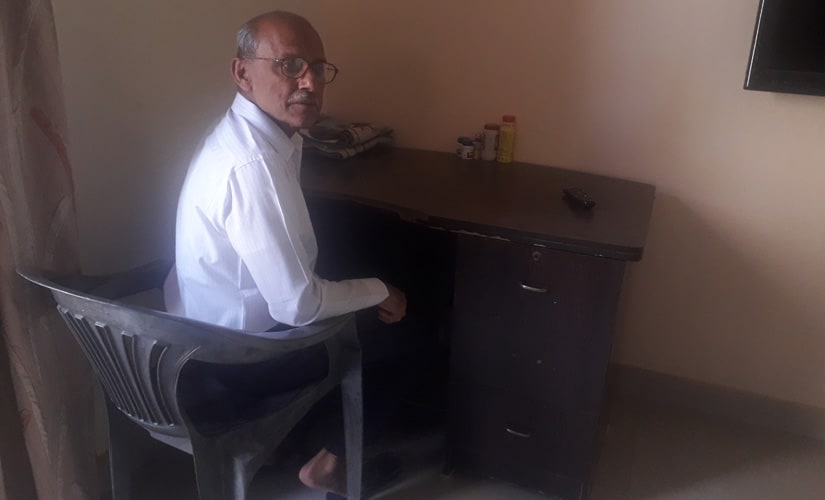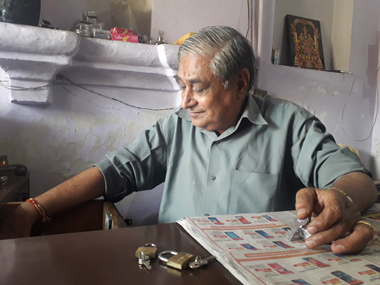Editor’s note: This is part of a multi-article series on the jobs crisis in the three states crucial to Lok Sabha election 2019: Chhattisgarh, Bihar and Uttar Pradesh.
***
Murarilal Gupta picks up a pocket-sized lock from the table and takes over 10 minutes to explain the process behind its manufacturing. “At least 70 people work on it before it is packaged and sold,” he says. Seventy or Seventeen? This reporter asks to confirm. “Bhai, yeh Aligarh ka tala hai (Brother, it’s a lock from Aligarh),” he retorts, sitting in his shop at Jaiganj, one of the hubs of the lock industry in the city. The odour of open sewers running through the narrow alleys hovers in the air. [caption id=“attachment_6455471” align=“alignleft” width=“380”]  Murarilal Gupta talks about the challenges faced by Aligarh’s lock industry. Image credit Parth MN[/caption] Estimates suggest the turnover of the industry is over Rs 200 crore per annum, with more than 1,000 industries registered in the district. The ones unregistered could be anywhere between 5,000-10,000. That too is a conservative estimate. Locks of Aligarh are sold across India, as it has been a hub since the time of the Mughals. But the Tala Nagri of Uttar Pradesh, as Aligarh is popularly called, is struggling due to the combination of demonetisation, GST and invasion from China. “How much do you think it costs?” Gupta, 71, who has been in this trade for 50 years, asks after explaining the process that takes 70 people to make a lock. “Rs 22,” he does not wait for a guess. “How does one pay the labour cost and still make a profit?” The lock makers in Aligarh say they have found it hard to remain in the competition once China entered the market. “The finishing of their product is better, the quality is good, and they sell at half the price,” says Gupta. “Everybody in this trade is wondering how to stay afloat in the market. China has better facilities, I am guessing they are encouraged by their government as well. Otherwise, they wouldn’t be able to sell at such a lower price. Our technology, on the other hand, is outdated. And let alone encouragement from the government, our policies further drive us into trouble.” Gupta is talking about demonetisation and GST. The bigger factories that can afford to hire sizeable chunk of labourers are, although struggling, but still in the business. They carry out every step of the manufacturing of the lock under one roof, like cutting, polishing, brightening and so on and so forth. Apart from them, there were single-room factories that engaged in only one aspect of lock making. Some indulged in polishing, some in cutting and so on. They collapsed after demonetisation. The rest folded after GST since many of them were unregistered. [caption id=“attachment_6455531” align=“alignnone” width=“825”]  Mohammad Aslam Khan talks about the downslide of the lock industry in Aligarh. Image credit Parth MN[/caption] Mohammad Aslam Khan, 69, who has a factory that makes keys, says most of those ran a small lock factory in one room and lived in another room. “Micro would be an overstatement,” he says. “Earlier, we had to pay sales tax of 2 percent, 5 percent VAT and 2 percent of the tax on the raw material. With GST, it has increased to a total of 18 percent. We do get the tax rebate, but micro industries cannot afford to wait for it. They sell their product to mediators. They do not have the infrastructure or network of distributors.” As a result, most of those who were self-employed in the industry or worked as labourers, now ride e-rickshaws in Aligarh to make their ends meet. Asad Farooq, 39, shut his lock factory a few months after demonetisation. “Most of the transactions happened in cash,” he says. “There was no way I could continue. I had 20 workers working for me. Had to lay off all of them. My father had started the factory when I was a kid.” After the factory shut down, Asad hired an e-rickshaw for a while. “But that too did not work and I gave it up after a year,” he says. “I am looking to enter the business again but everyone keeps telling me this is not a good time. The market is down. I have had to borrow money for survival.” At a distance of 50 kilometres from Aligarh, in the town of Khurja in the bordering district of Bulandshahr, the traditional pottery business is suffering from the same crisis. The town houses about 300-400 micro industries. Even though the struggle is not as acute, manufacturers admit to having laid off labourers in the recent past. They say the manufacturing process has been on and off. Sushila, who has been working as a labourer in a factory for 7-8 years, says most of the other workers have had to migrate to Punjab and Haryana to harvest wheat because manufacturing units do not need them as frequently. “Usually there would be about 8-10 of us working at a time,” she says, packing teacups, along with two other workers. “The production has decreased. The manufacturers have had to cut down on their margins.” [caption id=“attachment_6455591” align=“alignnone” width=“825”]  Sushila, who has been working as a labourer in a factory for 7-8 years, says most of the other workers have had to migrate to Punjab and Haryana to harvest wheat because traditional pottery manufacturing units do not need them as frequently. Image credit Parth MN[/caption] The manufacturers here keep a few permanent workers, and the rest on a contract basis depending on the season. They get Re 1 behind every cup they work on. The permanent ones have not been touched yet, but the contractual workers’ phones are not ringing as much. The months of April and May are supposed to be peak season, along with the festival of Diwali in November. But the orders are not flowing the way they used to. A supervisor working with Sushila says the factories are not tapping into workers as much as they used to. “Even the ones that are working, they finish their jobs by 2 or 3 in the afternoon,” he says. However, the industries in Bulandshahr are still at a stage where they can plan a reinvention to remain relevant. The ones in Aligarh are way past that stage. Mohammad Aslam Khan says his grandfather had started the key factory. “I am 69, so you can imagine how old it must be,” he says. “Mine is the third generation in this trade. My kids are also involved in it. But there is no way the fifth generation would take it forward.”


)
)
)
)
)
)
)
)
)



